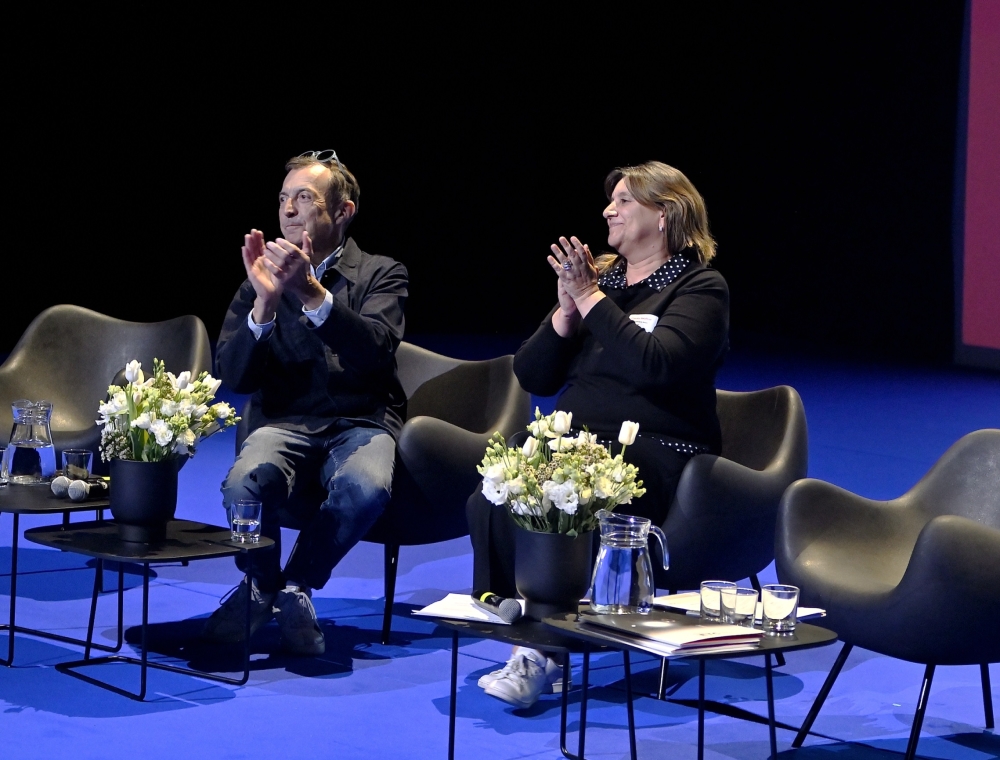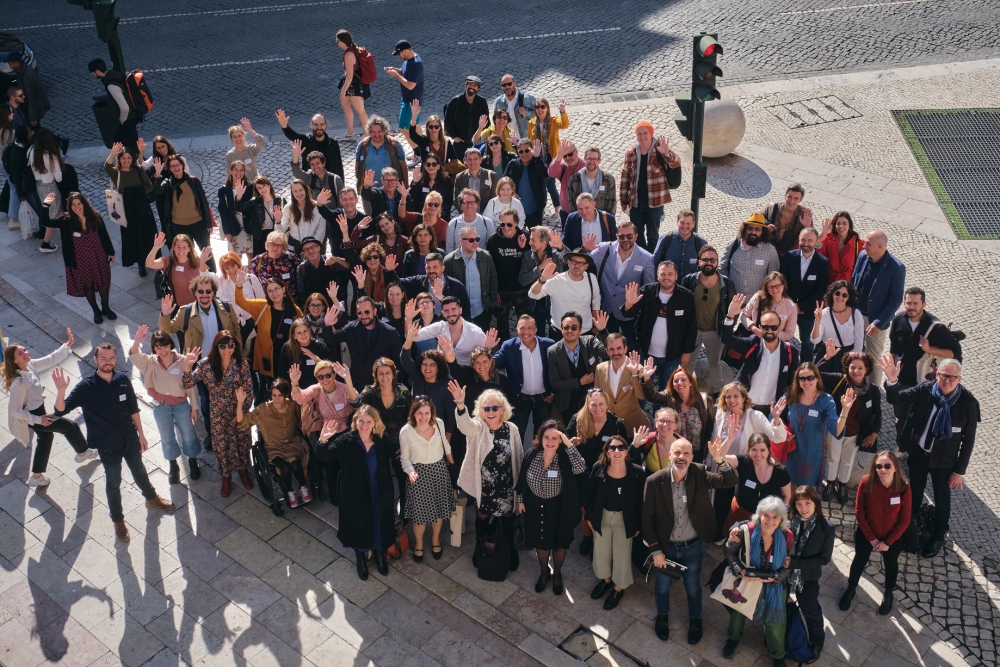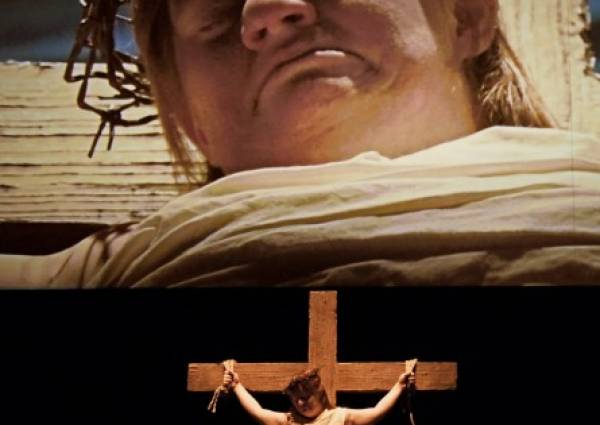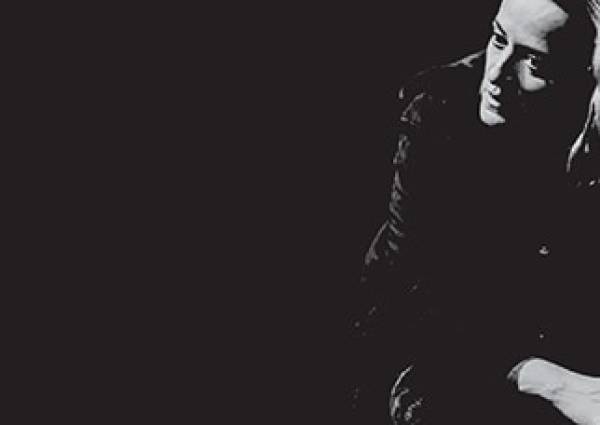Serge Rangoni, ETC President, has been Artistic Director and General Manager of Théâtre de Liège/Belgium for almost 20 years. He has overseen the move to a major new building, a rebranding of the whole theatre, and led Théâtre de Liège through a boom in European and international projects.
Cláudia Belchior is ETC Treasurer and Artistic Advisor at Centro Cultural Belem/Portugal. Before this, she spent 8 years as President of Teatro Nacional D. Maria II – where she also oversaw the start of a major building redevelopment, a dramatic rise in audience numbers, and laid the strategic framework for the theatre’s current year-long ‘National Odyssey’ of performances and collaborations around Portugal.
Together, they reflect on their styles of leadership in European theatres, and what they see as the biggest challenges for the sector.
ETC: What qualities are essential in a theatre leader? How would you describe your leadership style?
SR: Leadership in a theatre involves spending a lot of time on two things: finance and human resources (HR). Within this there are of course different approaches to working with public funding and supplementing income with European projects, coproductions, networks and so on. But it’s important to remember this.
I also think leaders need a vision that is both local and open to the world. I’m not from Liège, and before theatre, I worked for a Museum of Contemporary Art and in the Cabinet of a Minster. Because of this outlook and political culture, I don’t want the theatre to be only for entertainment, but rooted in the city, working with universities, the town council, local people… That’s why we set up projects like IMPACT and Rêvons Liège 2030, two collaborations to imagine the future with universities. There can be a tendency to stay in our bubbles, thinking ‘we were once a rich region, now the funding is decreasing, nothing is going our way….’ No. We must give the audience something very strong, very local, but also forward-thinking and collaborative.
“For me, there is no monopoly of leadership in a theatre. You instead have a lot of levels of leadership that are essential to make the theatre work." - Cláudia Belchior
CB: “For me, there is no monopoly of leadership in a theatre. You instead have a lot of levels of leadership that are essential to make the theatre work: the Head of Production, the Artistic Director, the main Stage Manager….
I started as a Producer and a Stage Manager, and that gave me a 360-degree view of what a theatre needs to work. I think my main characteristic is to be practical, understanding the people who work in the theatre very well, and what they are trying to achieve. As you mentioned, running a theatre has a lot to do with being financially viable and legally well-organised; there’s a lot of HR and finances, there’s a lot of lobbying and diplomacy with the finances minister and the cultural minister. There is also the need to lead within culture itself, which is making productions, making projects, and showing a different way of thinking and experiencing the world. We work with ideas and thoughts, balancing the need to be sustainable, financially sustainable, and creatively audacious.

ETC: What do you think are the most important trends and challenges facing theatre in the 2023/24 season?
CB: Many of the challenges cultural leaders face are about how to stay financially healthy, especially during the current financial crisis, but also how to engage digitally, how to network with people, how to be environmentally sustainable. These are not only challenges for cultural institutions, but I think that we face our own version because we produce non-replicable, unique ideas. Theatre is not a factory – our priority is to make people think, laugh, to be sad.
We also have to face the influence of political regimes, giant corporations that say what the politics should be…. as cultural leaders we must maintain a moral conviction to confront and subvert authority. Yet, at the same time, we have to keep it diplomatic, through dialogue. That’s a big challenge. Theatre is a unique form of expression, which has the ability to confront and expose dangerous ideas.
SR: I agree that theatre is unique. It’s not like film, or a book – we are in direct dialogue with audiences. Look at the big topic at Avignon Festival this year, the show ‘Carte noire nommée désir’ by Rebecca Chaillon, which generated a very strong reaction from audiences during the show, articles every day … I don’t think a film for instance gives you the same impact. Film in some ways reaches a smaller audience, too, despite what lots of politicians think. A successful European film in Belgium would reach 5,000 people with a much larger budget than theatre – and if we have performances in our theatre, at others in our country, and a little bit outside, we can reach far more people. It’s another reason why we have to strengthen the audience for theatre across Europe.
“I also appreciate what you said about dialogue and doing this in a subtle way. One of our challenges is always to enlarge the audience and engage everyone, all groups in society. It’s not that easy to do. When I started my career, the aim was to have people with different ages, social classes in the room. I don’t think it’s possible in this sense anymore. You need to have a different kind of programming for different kinds of audiences, and afterwards, you try to interest one part of your audience in the other things. It’s almost impossible to have one performance that would interest everybody because people stay in their tribes. I know some colleagues in Belgium that have what you could describe as very ‘woke’ programming -- and the artists involved in this think it’s not enough, they want to go further. But if you do so you close your audience. You have an audience very interested in woke programming, but no dialogue possible with other people. And I think, no, you of course have to speak about diversity, decolonisation, but also to reach people who are not completely convinced – otherwise you have an LGBTQI+ performance and only LGBTQA+ in the room. It’s complicated; society is completely split today. You see it in politics too.

CB: I also think, and this is a big difference from 10-15 years ago, there is a necessity to explain why we are showing determined productions. For example, 15 years ago we would just present a programme and that’s it. Now we have workshops, readings, conferences, talks after the shows….
In my case, we try to eliminate these borders and tribes that you mention. Some subjects are not just for the LGBTQIA+ community, or people with a different ethnicity. It takes a lot of time and reflection to do this work without being patronising. There is also a big challenge about how to bring people together in the same agora, as there is a lot of bad feeling between these tribes and theatre should help to resolve this.
ETC: How important do you think networks and cross-Europe exchange is for tackling the challenges facing theatre?
CB: I think networks are fundamental. We are not alone in the world. In the case of ETC, we are a group of European theatres, and Europe is not the same. It’s only through meeting each other, listening to each other, hearing – not trying to talk so much, but to hear what people think – that you can learn. We don’t take ownership of ideas or have unique problems. Some countries have different solutions, and we have to hear them.
For artistic work it’s essential to be together, to learn to exchange ideas. Our differences make us so rich, and it’s also what unites us and gives and strength. I think networks are crucial if we want to become more supportive and tolerant with each other.
SR: Yes. We have more and more countries across Europe where the situation is not easy. Poland, Hungary, even Italy and parts of France... It’s really important to be in the ETC network, to share these challenges, to support each other. We can look at what we have done as a network with our Ukrainian colleagues over a long period of time, which began with the Ukrainian showcase when Russia invaded Crimea. We were immediately ready to act when Russia conducted its full-scale invasion in 2022, offering structured support such as inviting Ukrainian artists to do residencies in our theatres, covering the costs of their ETC membership, sharing calls for necessary materials to keep their theatres working. Networks are essential.
"I would advise people to experiment with different positions in the theatre. From the ticketing office, to construction, as an assistant to a director, backstage... To understand everything, you have to be involved in different positions, even if you’ve been to really good theatre schools." - Serge Rangoni
What advice would you offer to emerging European theatre leaders?
CB: “I think you really need to believe in what you are doing in this profession. It’s a mixture of resilience and a sort of devotion. When we meet our audiences, whether they come to our theatres, or are in schools, or in a street – it goes back to what you were saying about Rebecca Chaillon’s play at the Festival d’Avignon – you see the power of theatre. People will disagree and be confronted by ideas. They’ll be shocked, sometimes agree, sometimes be surprised, because theatre is a fundamentally sociable place. It’s one of the most beautiful things in the world to see people sit outside and discuss a play for hours once it ends.
As cultural leaders, we cannot forget that we are working with a fundamentally free space of ideas. That’s what we also try to do inside ETC. Of course, horrible things happen in the world, but we stay together, we talk, we decide to make things, we have solidarity with each other. I would say this: we don’t have to help the Government, we have to help the artists, the people who make the theatre. We can’t forget what we’re doing and lose this focus.
SR: I would tell leaders one thing: you need to be very dedicated and work a lot. Theatre shows are in the evening. During the days you work. Saturday you are at the theatre too. It’s important to underline this. We see a new generation, who like to have a more quiet life, and with theatre the truth is that it’s really difficult, maybe impossible. Secondly, I would advise people to experiment with different positions in the theatre. From the ticketing office, to construction, as an assistant to a director, backstage. If we have no actors and creative teams, theatre doesn’t exist. And how do they work? What strange work it is, to act the same thing everyday. To understand this, you have to be involved in different positions, even if you’ve been to really good theatre schools. And then, I would say, travel and work in at least three European countries. Go outside and see how everything works.
CB: I agree. When I started this conversation, I mentioned there are several leaderships in the theatre. There is the ticket office, and front of house for instance, which is essential. How do the audience enter the theatre? How do they feel? Do they have any complaints? When you reach a position as the president or CEO of a theatre, you have to be aware of all the departments in the theatre - your life during the day is working with HR, ministers, contracts, trying to solve problems, and still going to see a rehearsal, going to see a show, and not only in your theatre, but going to other theatres, other companies, never losing the focus on what young artists are doing… It’s a full-time job. Not to say it’s a full-time life, because you have, say, 15 days that you take off each year, but even then you’re at the summer festivals. So start by going to different places, and different parts in the theatre, and always remember why you started doing this work in the first place.





